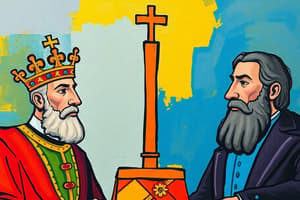Podcast
Questions and Answers
What key concept distinguishes national sovereignty from popular sovereignty?
What key concept distinguishes national sovereignty from popular sovereignty?
- It involves imperative mandates.
- It is indivisible and cannot be shared. (correct)
- It is exercised through universal elections.
- It emphasizes the collective will of individuals.
Which characteristic of sovereignty means that a mandate is temporary and cannot be permanent?
Which characteristic of sovereignty means that a mandate is temporary and cannot be permanent?
- Inalienable
- Indivisible
- Imprescriptible (correct)
- One
In which country is a referendum called by the king as part of their semi-direct democracy?
In which country is a referendum called by the king as part of their semi-direct democracy?
- France
- The UK
- Italy
- Spain (correct)
How is sovereignty represented in France according to its constitution?
How is sovereignty represented in France according to its constitution?
What is a notable limitation of parliamentary sovereignty in the UK?
What is a notable limitation of parliamentary sovereignty in the UK?
What best defines a 'nation' according to the content?
What best defines a 'nation' according to the content?
Which statement accurately describes the emergence of the first nation state in the EU?
Which statement accurately describes the emergence of the first nation state in the EU?
How did the concept of the nation play a role in France's opposition to absolutism?
How did the concept of the nation play a role in France's opposition to absolutism?
What is the main principle stated in Article 3 of the Document on Human and Civil Rights (DHCR) concerning sovereignty?
What is the main principle stated in Article 3 of the Document on Human and Civil Rights (DHCR) concerning sovereignty?
What defines a 'nation state' in contrast to a 'nation'?
What defines a 'nation state' in contrast to a 'nation'?
What is the primary mission of administrative police?
What is the primary mission of administrative police?
Which level of public order does not include public health?
Which level of public order does not include public health?
What is a condition for administrative measures as per the proportionality test?
What is a condition for administrative measures as per the proportionality test?
In the German legal system, what distinguishes administrative police from judicial police?
In the German legal system, what distinguishes administrative police from judicial police?
Under which article are states allowed emergency powers in Germany?
Under which article are states allowed emergency powers in Germany?
What distinguishes general administrative power from special administrative power?
What distinguishes general administrative power from special administrative power?
Which circumstance does NOT qualify as an exceptional case for administrative actions?
Which circumstance does NOT qualify as an exceptional case for administrative actions?
Which principle must administrative measures comply with to be deemed appropriate?
Which principle must administrative measures comply with to be deemed appropriate?
What is the principle of subsidiarity in relation to Swiss cantons?
What is the principle of subsidiarity in relation to Swiss cantons?
Which of the following is an exclusive power of the Swiss Confederation?
Which of the following is an exclusive power of the Swiss Confederation?
How many representatives does each Canton send to the Council of States in Switzerland?
How many representatives does each Canton send to the Council of States in Switzerland?
Which political theorist is not associated with the founding principles of the separation of powers?
Which political theorist is not associated with the founding principles of the separation of powers?
In a strict presidential system, which of the following is true?
In a strict presidential system, which of the following is true?
Which type of system is characterized by a flexible separation of powers?
Which type of system is characterized by a flexible separation of powers?
What document is considered one of the early frameworks that limited the power of the king?
What document is considered one of the early frameworks that limited the power of the king?
Which of the following represents a joint responsibility in Swiss governance?
Which of the following represents a joint responsibility in Swiss governance?
What does Article 5 emphasize about the republic?
What does Article 5 emphasize about the republic?
Which article discusses the distinction between ordinary and specific statute regions?
Which article discusses the distinction between ordinary and specific statute regions?
What powers are attributed to the regions according to Article 117?
What powers are attributed to the regions according to Article 117?
Which is NOT a type of local entity mentioned in the content?
Which is NOT a type of local entity mentioned in the content?
What is the role of regional statutes according to Article 123?
What is the role of regional statutes according to Article 123?
What is a primary concern regarding the financial autonomy of communities, particularly with Catalonia?
What is a primary concern regarding the financial autonomy of communities, particularly with Catalonia?
What is allocated to the central government as per Article 158?
What is allocated to the central government as per Article 158?
Which statement accurately describes the relationship between the state and regions under the power-sharing model?
Which statement accurately describes the relationship between the state and regions under the power-sharing model?
What is the first step in the bill process in parliament?
What is the first step in the bill process in parliament?
Which two individuals are key figures associated with the Salisbury doctrine?
Which two individuals are key figures associated with the Salisbury doctrine?
What major change was introduced by the Parliament Act of 2011?
What major change was introduced by the Parliament Act of 2011?
What was a consequence of the 2005 reform regarding the House of Lords?
What was a consequence of the 2005 reform regarding the House of Lords?
Under the Salisbury doctrine, what was argued regarding the House of Commons?
Under the Salisbury doctrine, what was argued regarding the House of Commons?
What happens if a government loses a confidence motion before 2011?
What happens if a government loses a confidence motion before 2011?
How many judges were responsible for hearing appeals in the House of Lords before the 2005 reform?
How many judges were responsible for hearing appeals in the House of Lords before the 2005 reform?
Which of the following options describes the monitoring function of the House of Commons?
Which of the following options describes the monitoring function of the House of Commons?
Flashcards
National Sovereignty
National Sovereignty
The principle that a nation has supreme authority within its territory, free from external control.
Popular Sovereignty
Popular Sovereignty
The idea that individuals have ultimate power and that the government derives its legitimacy from the consent of the governed.
Semi-Direct Democracy
Semi-Direct Democracy
Combining elements of representative democracy (elected officials) and direct democracy (referendums and initiatives).
Parliamentary Sovereignty
Parliamentary Sovereignty
Signup and view all the flashcards
Referendum
Referendum
Signup and view all the flashcards
Nation
Nation
Signup and view all the flashcards
Nation State
Nation State
Signup and view all the flashcards
Sovereignty of the Nation
Sovereignty of the Nation
Signup and view all the flashcards
National Unification
National Unification
Signup and view all the flashcards
Unification of Spain under Ferdinand and Isabel
Unification of Spain under Ferdinand and Isabel
Signup and view all the flashcards
Relationship between regulations and administrative acts
Relationship between regulations and administrative acts
Signup and view all the flashcards
Administrative Police
Administrative Police
Signup and view all the flashcards
Judicial police
Judicial police
Signup and view all the flashcards
General administrative power
General administrative power
Signup and view all the flashcards
Special administrative power
Special administrative power
Signup and view all the flashcards
Proportionality test
Proportionality test
Signup and view all the flashcards
State of emergency in France
State of emergency in France
Signup and view all the flashcards
Entick vs. Carrington (1765)
Entick vs. Carrington (1765)
Signup and view all the flashcards
Financial Autonomy
Financial Autonomy
Signup and view all the flashcards
Article 114 of the Italian Constitution
Article 114 of the Italian Constitution
Signup and view all the flashcards
Regions with a Specific Statute
Regions with a Specific Statute
Signup and view all the flashcards
Regalian Fields
Regalian Fields
Signup and view all the flashcards
Field of Concurring Legislation
Field of Concurring Legislation
Signup and view all the flashcards
Regions with an Ordinary Statute
Regions with an Ordinary Statute
Signup and view all the flashcards
Statutes of Autonomy
Statutes of Autonomy
Signup and view all the flashcards
Article 5 of the Italian Constitution
Article 5 of the Italian Constitution
Signup and view all the flashcards
Bill Process
Bill Process
Signup and view all the flashcards
Salisbury Doctrine
Salisbury Doctrine
Signup and view all the flashcards
Powers of HOC against the Gov
Powers of HOC against the Gov
Signup and view all the flashcards
Confidence Motion
Confidence Motion
Signup and view all the flashcards
Pre-2011 Government Accountability
Pre-2011 Government Accountability
Signup and view all the flashcards
Parliament Act 2011: Self-Dissolution
Parliament Act 2011: Self-Dissolution
Signup and view all the flashcards
Judicial Function of the HL
Judicial Function of the HL
Signup and view all the flashcards
Transfer of Judicial Powers
Transfer of Judicial Powers
Signup and view all the flashcards
Principle of Subsidiarity
Principle of Subsidiarity
Signup and view all the flashcards
Exclusive Federal Powers
Exclusive Federal Powers
Signup and view all the flashcards
Exclusive Cantonal Powers
Exclusive Cantonal Powers
Signup and view all the flashcards
Council of States
Council of States
Signup and view all the flashcards
Separation of Powers
Separation of Powers
Signup and view all the flashcards
Presidential System
Presidential System
Signup and view all the flashcards
Parliamentary System
Parliamentary System
Signup and view all the flashcards
Strict Separation of Powers
Strict Separation of Powers
Signup and view all the flashcards
Study Notes
Introduction to Public Law of EU Countries - Lesson 1: The Concept of Nation States
- Nation: A large group of people who share the same language, traditions, and history, but not necessarily the same geographical location.
- Nation-State: A politically organized territory with a defined population that identifies as a nation.
Emergence of Nations and Nation-States in Europe
- Spain (1st Nation-State):
- 1478: King John II of Aragon died.
- Ferdinand and Isabella unified Aragon and Castile (marriage).
- 1492: Granada was conquered, contributing to Spanish unification.
- Ferdinand expelled people from Spain who didn't share Spanish language and/or history.
- France (2nd Nation-State):
- The concept of a nation became important as a means to challenge absolutism.
- Before the nation-state, the source of power was often justified by God, but the nation became the source of power.
- Article 3 of the Declaration of the Rights of Man and the Citizen asserts the nation as the ultimate source of power.
- The Franco-Prussian War (1870-1871) reinforced national feelings in France.
- Italy (3rd Nation-State):
- Italy was divided into several kingdoms.
- Mazzini promoted the idea of an Italian nation.
- The unification process included military campaigns and political alliances with other countries.
- Garibaldi's army helped annex southern Italy.
- 1861: Italy was unified.
- UK (4th Nation-State):
- In 2019, the UK had a population of approximately 67 million.
- Multiple countries within the UK were unified.
Additional Notes
- Sovereignty: The supreme authority of a nation-state within its territory.
- National Sovereignty: The idea of a nation's supreme authority residing in the nation itself, rather than in a single ruler or entity.
- Popular Sovereignty: The idea that the ultimate source of political authority rests in the people.
Studying That Suits You
Use AI to generate personalized quizzes and flashcards to suit your learning preferences.
Related Documents
Description
Test your understanding of national and popular sovereignty, along with the nuances of parliamentary sovereignty. This quiz covers key concepts and examples from various countries, including France and the UK. Challenge yourself to distinguish between different types of sovereignty effectively.




